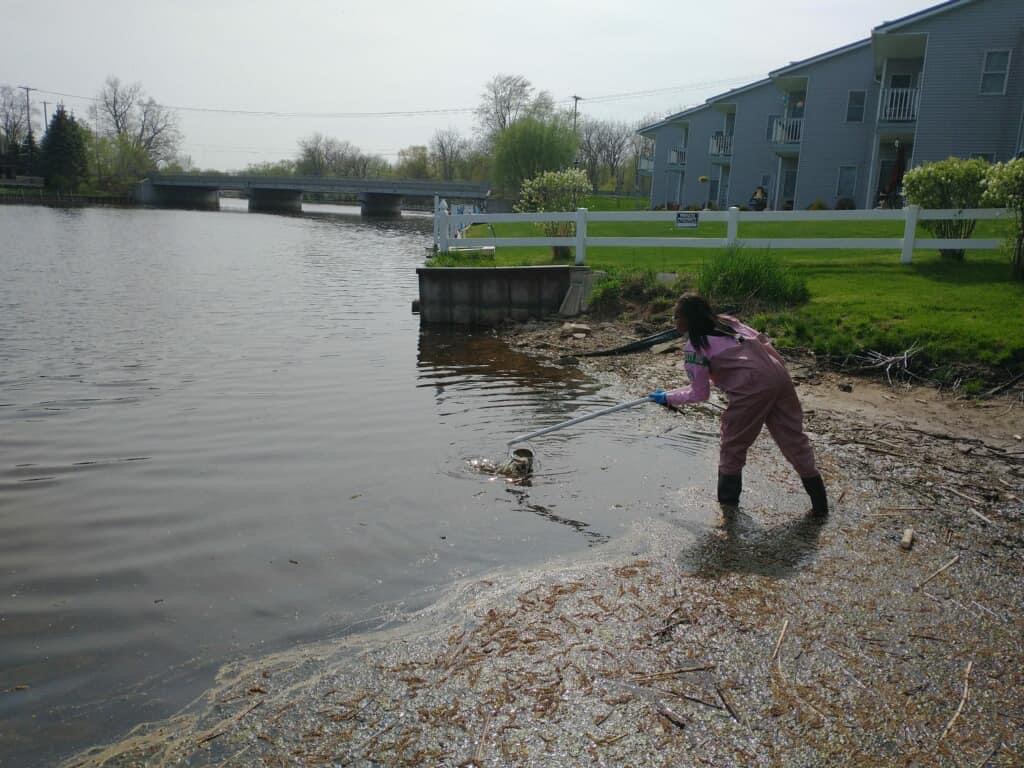FAMU Ph.D. Graduate’s Passion for Environmental Justice Fuels Scientific Research

For Andrea Pugh-Kelley, the Flint Water Crisis and contamination of the Great Lakes is personal
By Andrew J. Skerritt
For third-generation Rattler Andrea Pugh-Kelley, walking onstage to be hooded for her Ph.D. was the culmination of a journey of scientific research and environmental justice that began in elementary school.
In the aftermath of the city of Flint, Michigan, water crisis, Pugh-Kelley wrote her dissertation on PFAS, an emerging major contaminant in the Great Lakes region.
Per- and polyfluoroalkyl substances or PFAS are chemicals that resist grease, oil, water, and heat. First used in the 1940s, PFAS are found in hundreds of products, including stain- and water-resistant fabrics and carpeting, cleaning products, paints, and fire-fighting foams. And PFAS contamination has potential widespread health impacts.

“One of my career goals is to continue to create research that is meaningful and has real-world impact and to pursue environmental justice for communities in postindustrial cities,” said Pugh-Kelley, a National Oceanic Atmospheric Administration (NOAA) physical research scientist. “I want to show the real-world implications for my research.”
Over the past few years, her research involved traveling back to the Great Lakes region to take water samples from the rivers leading to Lake Huron to determine the pathways of PFAS from river sources to drinking water intakes. One chapter of her dissertation retells the Flint water crisis as a PFAS crisis.
“The Flint River was intentionally used as a dumping ground for the auto industry, and they turned around and used it for human consumption. Prior to being used for human consumption, the Flint River found to have the second highest PFAS concentrations in Michigan,” said Pugh-Kelley. Despite the data, a Michigan state agency gave the city of Flint approval to use the Flint River as a source of drinking water. “The existing data was not shared with local decision makers nor the public. Additionally, there still is not enforceable Federal regulations for PFAS in drinking water. So had there been PFAS regulations in place, and/or the existing data shared, the Flint water crisis could have been averted.”
As a NOAA Center for Coastal and Marine Ecosystem (CCME) graduate scholar, Pugh-Kelley conducted her research under the supervision of Steve Morey, Ph.D., a distinguished research scientist for the NOAA CCME and a professor in the FAMU School of the Environment.
“It has been a privilege to work with Dr. Pugh, learn about the environmental justice issues her hometown community has faced, and see her passion for applying scientific knowledge to address such issues drive her research,” Morey said. “She had the foresight when she started the Ph.D. program of knowing that her research into contaminants that were not widely known at the time would soon become a topic of headlines and political action.”
Fifth Grade Scientist
Pugh-Kelley’s environmental research was born out of her personal experience. She grew up in Saginaw, Michigan, a postindustrial Midwest city, which, like Flint, its neighbor to the south, is littered with abandoned auto plants and factories that have left playgrounds and waterways like the Flint River, Saginaw Bay, and Lake Huron, polluted with lead, PFAS and other contaminants. One of her aunts was the director of lead abatement for Saginaw County. As a 9-year-old, she conceived a science fair project to grow sunflowers on school playgrounds to reduce lead contamination in the soil.
“I kept seeing commercials about childhood lead poisoning. So I asked, what could I do as a fifth grader for a science fair project to address the issue,” said Pugh-Kelley. “My neighborhood is surrounded by GM facilities. You can correlate that with increased childhood asthma and lead poisoning rates, increased lead contamination and diminished water quality. A lot of those factories were intentionally located along waterways for transportation and the ability to dump waste into the water. They are also commonly collocated in communities of color/low-socioeconomic status as they are viewed as paths of least resistance.”
As she got older, her passion for environmental science never waned. Kelley-Pugh competed in science fairs throughout middle and high school. As a sophomore, she won second place in the Intel International Science contest. Initially, she had planned to attend the University of California, Los Angeles (UCLA) but changed her mind following a 2011 FAMU campus visit. Her grandfather, John Pugh, mother, Canika Pugh, and two aunts are all FAMU graduates.
“I had no intention of attending FAMU. I wanted to be different,” said Pugh-Kelley, who was leaning toward studying pharmaceutical sciences or business. But during that campus visit with one of her aunts, Yvette Pugh, she met Michael D. Abazinge, Ph.D., then a professor in the FAMU School of Environment and associate director of the NOAA CCME.
“Dr. Abazinge convinced me that the FAMU Environmental program would be a great fit as I was already doing so much environmental research science,” said Pugh-Kelley, who wrote her senior undergraduate thesis on the Flint drinking water crisis as the issue was making national headlines. In 2016, she returned home to attend the University of Michigan School of Public Health for her master’s in public health, environmental quality and health. As a C.S. Mott Foundation Environmental Fellow in Flint, Pugh-Kelley conducted research to determine the feasibility of implementing a Water Affordability Program in the Great Lakes Water Authority Service Area and the feasibility of redeveloping the largest former GM automotive plant into a solar farm. Her scientific research fueled her activism and public policy engagement.
“By the time I completed my second year at the Foundation, everyone was asking me about PFAS. I was still focusing on lead,” she said. “While at the Foundation I served on a panel to rewrite Michigan’s Lead and Copper Rule,” she said.
After grad school, Pugh-Kelley had no initial plans to return to Florida. But during a 2018 campus tour with her two younger siblings, who were still in high school, Pugh-Kelley stopped in see Professor Abazinge and CCME Budget Coordinator Cynthia Henry, who both convinced her that FAMU was the perfect place to further develop her passion for research and environmental justice and earn a Ph.D.

“I wasn’t interested in coming back, but you can’t stay away from FAMU for too long,” said Pugh-Kelley, whose brother and sister ended up coming to FAMU.
Her brother graduated from the School of Architecture and Engineering Technology this spring. Next year, her sister is scheduled to her a degree from the College of Pharmacy, Pharmaceutical Sciences, Institute of Health at FAMU.
“We have three generations of FAMU graduates,” said Pugh-Kelley, whose husband Kebbi Kelley, also earned his master’s degree at FAMU.
Knowing her family ties to FAMU and seeing Cynthia Henry and Professor Abazinge, who is now dean of the School of Graduate Studies and Research, made the August 4 Summer Commencement ceremony ever more special, she said.
“It was a full circle moment, having so many people there who were responsible for me initially attending FAMU,” Pugh-Kelley said.



